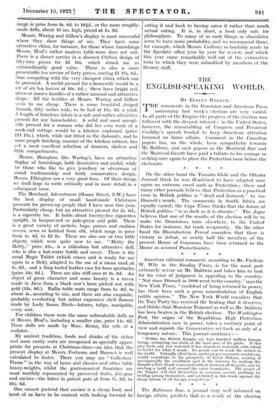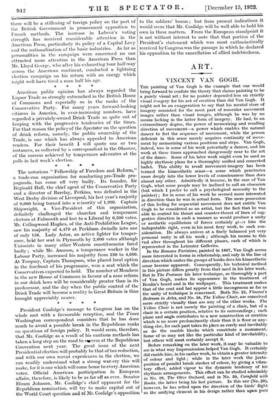THE
ENGLISH-SPEAKING WORLD.
By EVELYN WRENCH. THE comments in the Dominion and American Press concerning last week's election arc very varied. In all parts of the Empire the progress of the election was followed with the deepest interest ; in the United States, however, the reassembling of Congress and President Coolidge's speech tended to keep American attention focussed on home affairs. Comment in the Canadian papers has, on the whole, been sympathetic towards Mr. Baldwin, and such papers as the Montreal Star and the Montreal Gazette have paid a tribute to his courage in seeking once again to place the Protection issue before the electorate. *, *..
On the other hand the Toronto Globe'and the Ottawa Journal think he was ill-advised to have adopted once again an outworn creed such as Protection ; these and many other journals believe that Protection as a. practical issue in British politics is " dead and damned," to use Disraeli's words. The comments in South Africa are equally varied; the Cape Times thinks that the future of British politics " is as dark as it is obscure." The Argus believes that one of the results of the election will be to make the Dominions turn elsewhere, to the United States for instance, for trade reciprocity. On the other hand the Bloemfontein Friend considers that there is victory in defeat, as nearly half the members of the present House of Commons have been returned to the House as avowed Protectionists.
American editorial comment, according to Mr. Frederic W. Wile in the Sunday Times, is for the most part extremely severe on Mr. Baldwin and takes him to task for his error of judgment in appealing to the country. " Not since Disraeli in 1880 went to the country," says the New York Times, "confident of being returned to power, has there been such a gross miscalculation of English public opinion." The New York World considers that the Tory Party has received the beating that it deserves, and thinks that Monsieur Poineare as well as Mr. Baldwin has been beaten in the British election. The Washington Post, the organ of the Republican High Protection- Administration now in power, takes a contrary point of view and regards the Conservative set-back as only of a temporary nature. This journal continues :- "Within the British Empire are four hundred million human beings, occupying one-sixth of the land area of the globe. If this urea lucks any raw material it has abundant materials with which to barter for what it needs. Its people•can be made the richest in the world. Virtually all of them, under proper economic conditions, would contribute to the prosperity of Great Britain, making it incomparably the wealthiest spot in the universe by making the Empire a Free Trade commonwealth as between all its parts, and by erecting a tariff wall around the outer Isoinduries. The people of the Empire will find themselves in common accord, profiting by trading among themselves, and protected in this trade against the cheap labour of all foreign compet:tors."
* * * * The Baltimore Sun, a journal very well informed on foreign affairs, predicts that as a result of the election there will be a stiffening of foreign policy on the part of the British Government in pronounced opposition to French methods. The increase in Labour's voting strength has received considerable attention in the American Press, particularly its policy of a Capital Levy and the nationalization of the basic industries. As far as personalities in the campaign were concerned no one attracted more attention in the American Press than Mr. Lloyd George, who after his exhausting tour half-way across the American continent, conducted a lightning election campaign on his return with an energy which might well have tired a man half his age. * * * * American public opinion has always regarded the Liquor Trade as strongly entrenched in the British House of Commons and especially so in the ranks of the Conservative Party. For many years forward-looking citizens in America, in ever-increasing numbers, have regarded a privately-owned Drink Trade as quite out of keeping with the progressive tendencies of the times. For that reason the policy of the Spectator on the question of drink reform, namely, the public ownership of the Trade, is one which has always appealed to American readers. For their benefit I will quote one or two instances, as collected by a correspondent in the Observer, of the success achieved by temperance advocates at the polls in last week's election.
* * * The notorious " Fellowship of Freedom and Reform," a trade-run organization for conducting pro-Trade pro- paganda, has come off very badly. Its founder, Sir Reginald Hall, the chief agent of the Conservative Party and a director of Barclay, Perkins, was defeated in the West Derby division of Liverpool, his last year's majority of 9,000 being turned into a minority of 1,990. Captain Shipwright, a Vice-President of this organization, definitely challenged the churches and temperance electors at Falmouth and lost to a Liberal by 6,500 votes. Mr. Collingwood Hughes, of the Anti-Prohibition League, saw his majority of 4,479 at Peckham dwindle into one of only 156. Lady Astor, an active fighter for temper- ance, held her seat in Plymouth by 2,600 votes although Unionists in many other Western constituencies fared badly ; while Mr. Ammon, a temperance worker in the Labour Party, increased his majority from 250 to 4,600. At Torquay, Captain Thompson, who placed local option in the forefront of his programme, won a seat which the Conservatives expected to hold. The number of Members in the new House of Commons in favour of a sane reform in our drink laws will be considerably greater than in its predecessor, and the day when the public control of the Drink Trade will become a reality in Great Britain is thus brought appreciably nearer.
* * * * President Coolidge's message to Congress has on the whole met with a favourable reception, and the Times Washington correspondent considers that he has done much to avoid a possible break in the Republican ranks on questions of foreign policy. It would seem, therefore, that Mr. Coolidge as a result of his cautious methods has taken a long step on the road to stoccess at the Republican Convention next year. The great issue of the next Presidential election will probably be that of tax reduction, and with our own recent experiences in the election, we can readily understand what a strong war-cry this will make, for it is one which will come home to every American voter. Official American participation in European affairs, therefore, is likely to be as far off as ever. Senator Hiram Johnson, Mr. Coolidge's chief opponent for the Republican nomination, will try to make capital out of the World Court question and of Mr. Coolidge's opposition to the soldiers' bonus ; but from present indications it would seem.that Mr. Coolidge will be well able to hold his own in these matters. From the European standpoint it is not without interest to note that that portion of the President's statement which was most enthusiastically received by Congress was the passage in which he declared his opposition to the cancellation of allied indebtedness.



















































 Previous page
Previous page